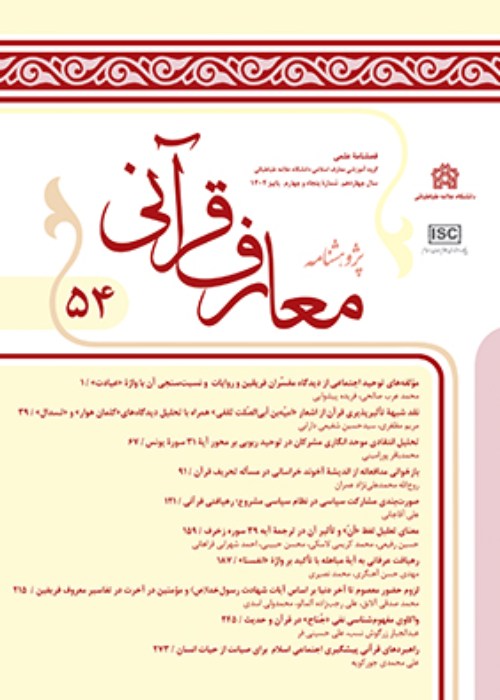Analytical-Critical Review of the Narration of Silent Recitation of the Basmalah in the Quranic Chapters by Imam Ali (AS)
The dispersion of opinions on the issue of reciting the Basmalah aloud or in silence has become one of the areas of divergence of Islamic schools of thought, and the main reason for this dispute doubts the revelatory nature of the Basmalah and its being a part of every chapter of the Qur'an. According to some definitive narratives that agree with rational axioms, the Basmalah is an essential part of the Qur’anic chapters. The Sirah of the Prophet (PBUH) and his companions, especially Imam Ali (AS) was based on reciting the Basmalah out loud, and any doubt about this issue paves the way for distortion of the Qur’an. However, in some Sunni sources, there is a hadith that contradicts what was mentioned above, as it indicates that Imam Ali (AS) recited the Basmalah in silence.
The background of this research can be divided into two general and specific parts. Generally, it can be done through the books of hadith and interpretation in which narrations and discussions about the Basmalah were mentioned specifically, the following research can be mentioned:
“The Possibility of the Basmala being a Verse from the Shia and Sunni Perspectives” by Zahra Askarzadeh.
“A Translation and Criticism of the Entry “Basmalah” in the Encyclopedia of the Holy Qur’an” by Bibi Sadat Behabadi and Hujjatullah Javani.
“Study and Analysis of Sheikh Baha’i’s Narrations and Criticisms in the Interpretation of ‘Urwah al-Wuthqā in the Unity of the Surahs and Partial-Nature of Basmalah” by Muhammad Ali Tajari and Muhammad Taghaddomi Saberi.
“Examination of the Opinions of Jurists, Commentators and Traditions of Ahl al-Bayt (AS) Regarding the Verse Bismillah al-Raḥmān al-Raḥīm” by Muhammad Qorbani Moghaddam.
“The Ontology of the Basmalah as an Introduction to Creating an Ontology of the Teachings of the Qur’an” by Hossein Hosseinzadeh.
“Investigation of the Partial-Nature of the Basmalah to Surahs of the Qur’an” by Muhammad Qorbani Moghaddam.
“The Verse of Basmalah, its Continuation and Revelation” by Hojjatullah ʻĀshūrī.
“Partial-Nature of the Basmalah and it’s Aloud Recitation” by Jafar Sobhani.
As it was mentioned, the basic problem in suggesting the partial or non-partial nature of the Basmalah, and thus the belief in its aloud or silent recitation, goes back to the conflicting narrations mentioned in this regard, and the problem remains until these narrations are scrutinized in terms of the chain of transmission and the text, and the research in this regard is only a repetition of the previous researches. The difference between this article and the other researches is that it examines the narration related to the silent recitation of the Basmalah narrated from Imam Ali (AS), in terms of the chain of transmission (Sanad) and the text, which has not been written in this regard until now.
This article aims to critically re-read the non-existence of Basmalah in the Qur’anic surahs using a descriptive-analytical method, based on the analysis of the chain of transmission and the text of the relevant narration.
The results of the research show that the aforementioned narration contains some serious problems. A: There is a major problem regarding its chain of transmission; because among the transmitters there are narrators who have been severely criticized by Sunni scholars. B: Some of the narrators are attributed to the Shias, and this contains a contradiction; because what they say completely contradicts the teachings of the Imams (AS) and his habit of reciting the Basmalah aloud. C: Analysis of historical reports indicates that the claim of dropping the Basmalah from prayer occurred under a calculated process initiated and supported by the Umayyad regime and with the policy of erasing Alawite monuments. Therefore, the possibility of falsification in these narrations becomes stronger.
According to the findings of this research, the aforementioned hadiths contain some serious problems. First: It has major problems in terms of the chain of transmission; because among the transmitters there are narrators who have been severely criticized by Sunni scholars. Second: Some of the narrators were attributed to Shias, and this contradicts the authentic hadiths that state that the Shia Imams (AS) considered the Basmalah to be part of the surahs of the Qur’an and therefore they used to recite it out loud. Finally, historical reports indicate that the idea of dropping the Basmalah emerged during a calculated process initiated and supported by the Umayyad regime. Therefore, there is a high possibility of Waḍʻ and Tadlīs (fabrication) in these narrations
- حق عضویت دریافتی صرف حمایت از نشریات عضو و نگهداری، تکمیل و توسعه مگیران میشود.
- پرداخت حق اشتراک و دانلود مقالات اجازه بازنشر آن در سایر رسانههای چاپی و دیجیتال را به کاربر نمیدهد.


